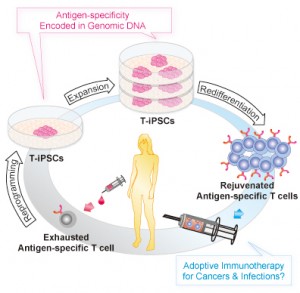iPS cell technology makes old T cells young Potential application of rejuvenated antigen-specific T cells to immunotherapy and immune regeneration

The human immune system is composed of multiple types of immune cells. Cytotoxic T cells are the front-line warriors combating pathogens and diseases. T-cell immune response is initiated most efficiently when naive CD8+ cytotoxic T cells are activated by their cognate antigens. In chronically ill patients, because of repeated stimulation by pathogenic antigens, T cells fall into a state known as “cellular senescence” or “exhaustion,” a type of aged state. Such replicative senescence is also a major issue for adoptive cell therapy using ex vivo-expanded antigen-specific cytotoxic T cells.

Illustration of T-cell immune system regeneration model by reprogramming to pluripotency and redifferentiation. © Toshinobu Nishimura
An exhausted antigen-specific CD8+ T cell in a patient is reprogrammed to iPSCs (T-iPSCs), inheriting the TCR gene rearrangements. Later, T-iPSCs are coaxed to redifferentiate back into CD8+ T cells with original antigen specificity and antigen-specific cytotoxicity. Newly differentiated T cells show rejuvenated properties such as increased growth potential and elongated telomeres by the hot telomerase activity in T-iPSCs. These manipulated T cells using iPSC techniques could be useful for future development of more effective immune therapies.
In the current study, Professor Hiromitsu Nakauchi and his research group at the Institute of Medical Science, the University of Tokyo demonstrated the rejuvenation of exhausted T cells by passing through induced pluripotent stem (iPS) cell intermediate. The researchers prepared T cells from HIV-infected patients and reprogrammed them into iPS cells (T-iPSCs). Furthermore, they showed that redifferentiation of these cells produced mature CD8+ T cells that recognize their original cognate antigen and exhibit long telomeres, the features of rejuvenation. This is significant because exhaustion of T cells limits cell expansion and efficiency of therapeutic use.
The system established here provides “rejuvenated and regenerated” antigen-specific T cells by taking advantage of reprogramming technology. These findings suggest that manipulating T cells using iPSC techniques could be useful for future development of more effective immune therapies.
Press release (EurekAlert)
Paper
Toshinobu Nishimura, Shin Kaneko, Ai Kawana-Tachikawa, Yoko Tajima, Haruo Goto, Dayong Zhu, Kaori Nakayama-Hosoya, Shoichi Iriguchi, Yasushi Uemura, et al.,
“Generation of rejuvenated antigen-specific T cells by reprogramming to pluripotency and redifferentiation”,
Cell Stem Cell 12 2013, 114-126, doi: 10.1016/j.stem.2012.11.002.
Article link
links
The Institute of Medical Science






